France church attack: Two arrested over killing of priest
French authorities hold two men while Saint-Etienne-du-Rouvray religious leaders refuse to give attacker a Muslim burial
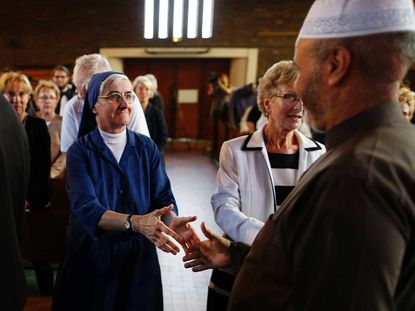
French authorities have placed two men under formal investigation after last week's attack on a church in Saint-Etienne-du-Rouvray, near Rouen, in which 86-year-old Father Jacques Hamel was killed.
One of the men, identified as Farid K, is said to have been a cousin of attacker Abdel Malik Petitjean and has been detained on suspicion of "terrorist involvement", French authorities say. The other, Jean-Philippe Steven J, was "put under formal investigation for allegedly attempting to travel to Syria in June with Petitjean", the BBC says.
French police are focusing on the encrypted messaging app Telegram, reportedly used by Petitjean and his co-attacker, Adel Kermiche, to communicate with a private forum of up to 200 people.
Subscribe to The Week
Escape your echo chamber. Get the facts behind the news, plus analysis from multiple perspectives.

Sign up for The Week's Free Newsletters
From our morning news briefing to a weekly Good News Newsletter, get the best of The Week delivered directly to your inbox.
From our morning news briefing to a weekly Good News Newsletter, get the best of The Week delivered directly to your inbox.
French news magazine L'Express said Kermiche had posted an audio message in the week before the attack saying: "You take a knife, you go in a church, you cause carnage… You cut two or three heads and there you are, it's done."
Meanwhile, religious leaders in the area have said they will not take part in the burial of Kermiche.
Imam Mohammed Karabila, the president of the local Muslim cultural association, told Le Parisien they would ignore the wishes of the attacker's family.
"We won't participate in preparing the body or the burial," he said.
A funeral mass for Father Hamel will be held tomorrow.
France church attack: French newspapers to stop publishing names of terrorists
29 July
The decision by several French media outlets to stop publishing the names and photographs of terrorists has sparked a debate about the effectiveness of media blackouts.
On Wednesday, Jerome Fenoglio of Le Monde, which has already stopped publishing extracts from Islamic State propaganda, including the group's claims of responsibility for attacks, said his newspaper would stop using pictures of jihadists "to avoid the possibility of glorifying them in death".
BFMTV, France's most-watched news network, also announced a ban on photos of terrorists. This was followed by similar pledges from the Europe 1 radio network, multilingual news website The Local and Le Croix.
After recent terror attacks in Nice and Normandy, a petition has been launched calling for terrorists to be anonymised in the French media. More than 100,000 people have backed a letter to the country's media watchdog warning that Mohamed Lahouaiej-Bouhlel and other killers could become "superstars" after excessive coverage, reports The Independent.
The decision by media companies, "part of a wider French debate about how the news media might be contributing to the extremist threat", comes as the French parliament debates whether to restrict news coverage of terrorist acts, says the Daily Telegraph.
Digital technology"To be seen as heroes, terrorists need an audience", writes Jason Burke in The Guardian. But he points out that "digital technology has put the means of both production and dissemination in terrorists' hands".
The growing consensus in the French media "is at odds with standard procedure by security services, the judiciary and politicians, who swiftly name attackers when their identities are confirmed", says The Independent.
Not all outlets have followed suit. France 24 journalist Wassim Nasr, a specialist in jihadism, told L'Express that if news sites do not publish information on terrorists "we leave the space free for others to fill". More people could be driven directly to online propaganda, he said, and in any case few extremists read the "mainstream media".
"We must resist this race towards self-censorship and grand declarations of intention," said Michel Field, the executive director of France Televisions.
Refusal to publish the information may also "fuel unsubstantiated right-wing conspiracy theories over supposed plots to mask the Islamist nature of some attacks", says The Independent. France's far-right Front National leader Marine Le Pen has already suggested the real motive for the move was to "hide the link with immigration", reports the Daily Mail.
France church attack: Second killer also known to police
Prosecutors in France have identified the second man involved in this week's murder of a priest in Normandy as 19-year-old Abdel Malik Petitjean.
Originally from a town in eastern France on the border with Germany, Petitjean was known to police and suspected of having "Islamist militant links", said a source close to the investigation.
He was allegedly the subject of a tip-off received by the French authorities from an unnamed foreign intelligence agency last Friday, the BBC reports. "The tip-off spoke of a man, whose photograph but not identity was supplied, preparing an attack in the coming days," it said.
Petitjean and his accomplice, Adel Kermiche, stormed a church in St-Etienne-du-Rouvray during morning mass on Tuesday, taking several hostages before slitting the throat of Father Jacques Hamel and seriously wounding another person. The two men were shot dead by police officers.
It was yesterday revealed that Kermiche was also well known to anti-terrorism police, after twice trying to travel to Syria, and was wearing an electronic tag at the time of the siege.
Islamic State has released a video purported showing the two attackers pledging allegiance to the group's leader, Abu Bakr al-Baghdadi. IS called them their "soldiers".
France's government and security forces are coming under increasing pressure to explain how two home-grown radicals, both known to authorities, were able to carry out such an attack.
"Opposition politicians have responded to the attacks with strong criticism of the government’s security record, unlike last year, when they made a show of unity after the Paris attacks," says Reuters.
Former president Nicolas Sarkozy, who is expected to enter next year's presidential election, told Le Monde newspaper: "All this violence and barbarism has paralyzed the French left since January 2015."
He added: "[The government] has lost its bearings and is clinging to a mindset that is out of touch with reality."
France church attack: Adel Kermiche twice tried to go to Syria
27 July
One of the two knife-wielding terrorists who slit a priest's throat in a Normandy church yesterday was a teenage jihadist who had twice tried to travel to Syria, it has been revealed.
Adel Kermiche, 19, was being monitored by an electronic tag when he and an unnamed accomplice burst into the church of St-Etienne-du-Rouvray, near Rouen, during morning mass.
As well as killing Father Jacques Hamel, 85, the pair also seriously wounded another member of the congregation before being shot by police marksmen.
Nun Sister Danielle, who managed to slip out of the church, told reporters: "Everyone was shouting, 'Stop, stop you don’t know what you’re doing.' They forced [Hamel] to his knees and obviously he wanted to defend himself and that's when the drama began. They were filming themselves preaching in Arabic in front of the altar."
She added: "Jacques was an extraordinary priest. He was a great man."
The attack has raised questions in the French press about how the homegrown radical was able to commit the gruesome attack despite being well-known to anti-terror police.
After twice being apprehended en route to Syria, Kermiche was placed on remand in May 2015. However, this March, a judge approved his request to be released, subject to conditions, which included living with his parents and wearing an electronic tag.
A neighbour told Le Parisien newspaper he had immediately guessed the attacker with the electronic tag was Kamiche, saying the teenager had long been reviled in the community for his extreme views.
"He came to a barbecue in the area in September and he wouldn't stop talking about Syria," the unnamed man said. "We asked him to recite a verse from the Koran and he couldn't even do that."
Colleagues and parishioners have paid tribute to Father Hamel, who was killed in front of the altar after almost 60 years as a priest.
Father Auguste Moanda-Phuati, the parish priest of the Eglise St-Etienne, where Father Hamel worked as an auxiliary priest, said: "He could have retired at 75 years old but seeing how few priests were around, he decided to stay and work, to continue to be of service to people, up until it all ended tragically."
Islamic State claims responsibility for Normandy church attack
26 July
Islamic State says two of its "soldiers" were responsible for this morning's attack on a church in Normandy in which a priest was killed and another person critically injured.
Two men armed with knives stormed the building in Saint-Etienne-du-Rouvray during mass, taking the priest, two nuns and several worshippers hostage. The attackers were later shot dead by police.
"There were more and more police then a crescendo of gunfire," a witness told France's BFM TV news channel. "Of course, given what is happening in the world, we thought of a [terrorist] attack. It was hard to believe what was happening."
Father Jacques Hamel, 84, reportedly had his throat slit by the attackers. A parishioner told The Guardian Hamel was "a man who did his job to the end", adding: "He was elderly but was always available for whoever - he was a good priest."
The Vatican condemned what it described as a "barbarous killing".
One of the attackers was reportedly on the French government's terror watchlist. The Paris anti-terror prosecutor has taken over the investigation.
IS announced on its Amaq news agency that the attack had been carried out "in response to the call to target the countries of the crusader coalition". France is part of the US-led coalition carrying out air strikes against the group on Iraq and Syria.
Speaking in Saint-Etienne-du-Rouvray, President Francois Hollande confirmed the attackers claimed to be acting in the name of IS. "We are faced with a group that has actually declared war and we have to fight this war using all means possible," he said.
Promising to hold a meeting with different faith leaders, Hollande urged the public to come together in the face of the ongoing terrorist threat. "All people feel affected so we must have cohesion. No one can divide us," he said.
The killing comes just a fortnight after a French-Tunisian national, Mohamed Lahouaiej Bouhlel, drove a lorry into crowds in Nice on Bastille Day, killing 84 people and injuring hundreds of others. The country's state of emergency, already in place for eight months, was extended as a result.
In addition, Paris suffered a series of high-profile attacks last year, including the murders at the Charlie Hebdo magazine offices on 7 January and a spate of attacks across the city on 13 November, which left 130 people dead.
"After criticisms of police shortcomings over the Nice attack, French anti-terrorist police moved with commendable speed to close down this hostage situation in a Norman church," says BBC security correspondent Frank Gardner.
"The selection of a church by the attackers, whatever their motives turn out to be, crosses a new red line in the grim history of recent attacks on continental Europe," he adds.
Create an account with the same email registered to your subscription to unlock access.
Sign up for Today's Best Articles in your inbox
A free daily email with the biggest news stories of the day – and the best features from TheWeek.com
-
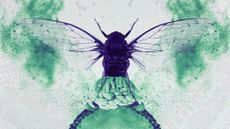 Cicada-geddon: the fungus that controls insects like 'zombies'
Cicada-geddon: the fungus that controls insects like 'zombies'Under The Radar Expert says bugs will develop 'hypersexualisation' despite their genitals falling off
By Chas Newkey-Burden, The Week UK Published
-
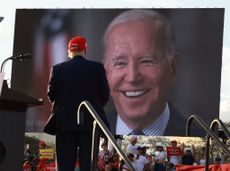 'Voters know Biden and Trump all too well'
'Voters know Biden and Trump all too well'Instant Opinion Opinion, comment and editorials of the day
By Harold Maass, The Week US Published
-
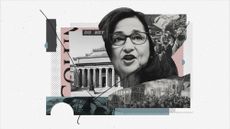 Is the Gaza war tearing US university campuses apart?
Is the Gaza war tearing US university campuses apart?Today's Big Question Protests at Columbia University, other institutions, pit free speech against student safety
By Joel Mathis, The Week US Published
-
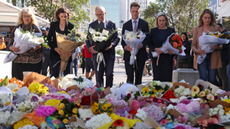 Sydney mall attacker may have targeted women
Sydney mall attacker may have targeted womenSpeed Read Police commissioner says gender of victims is 'area of interest' to investigators
By Julia O'Driscoll, The Week UK Published
-
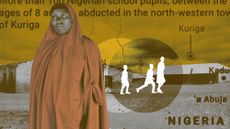 Why are kidnappings in Nigeria on the rise again?
Why are kidnappings in Nigeria on the rise again?Today's Big Question Hundreds of children and displaced people are missing as kidnap-for-ransom 'bandits' return
By Julia O'Driscoll, The Week UK Published
-
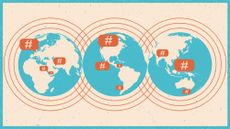 The #MeToo movements around the world
The #MeToo movements around the worldThe Explainer French men have been sharing stories of abuse in the latest calling out of sexual assault and harassment
By The Week Staff Published
-
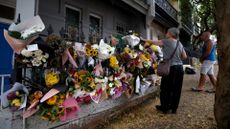 Deaths of Jesse Baird and Luke Davies hang over Sydney's Mardi Gras
Deaths of Jesse Baird and Luke Davies hang over Sydney's Mardi GrasThe Explainer Police officer, the former partner of TV presenter victim, charged with two counts of murder after turning himself in
By Austin Chen, The Week UK Published
-
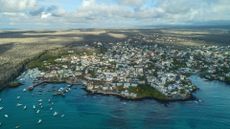 How the idyllic Galapagos Islands became staging post in world drug trade
How the idyllic Galapagos Islands became staging post in world drug tradeUnder the radar Ecuador's crackdown on gang violence forces drug traffickers into Pacific routes to meet cocaine demand
By Harriet Marsden, The Week UK Published
-
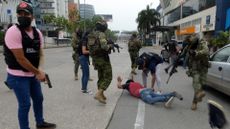 Armed gangs, prison breaks and on-air hostages: how Ecuador was plunged into crisis
Armed gangs, prison breaks and on-air hostages: how Ecuador was plunged into crisisThe Explainer Gangs launch deadly revenge after president declares state of emergency following escape of feared drug boss from prison
By Harriet Marsden, The Week UK Published
-
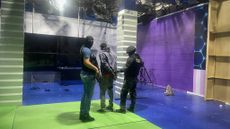 Ecuador tips toward chaos amid prison breaks, armed TV takeover
Ecuador tips toward chaos amid prison breaks, armed TV takeoverSpeed Read New President Daniel Noboa authorized the military to 'neutralize' powerful drug-linked gangs after they unleashed violence and terror across Ecuador
By Peter Weber, The Week US Published
-
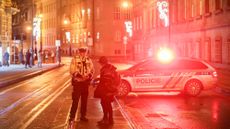 Prague shooting: student kills 14 people at university
Prague shooting: student kills 14 people at universitySpeed reads Police believe suspect, who killed himself, may have shot his father before carrying out mass murder
By Arion McNicoll, The Week UK Published